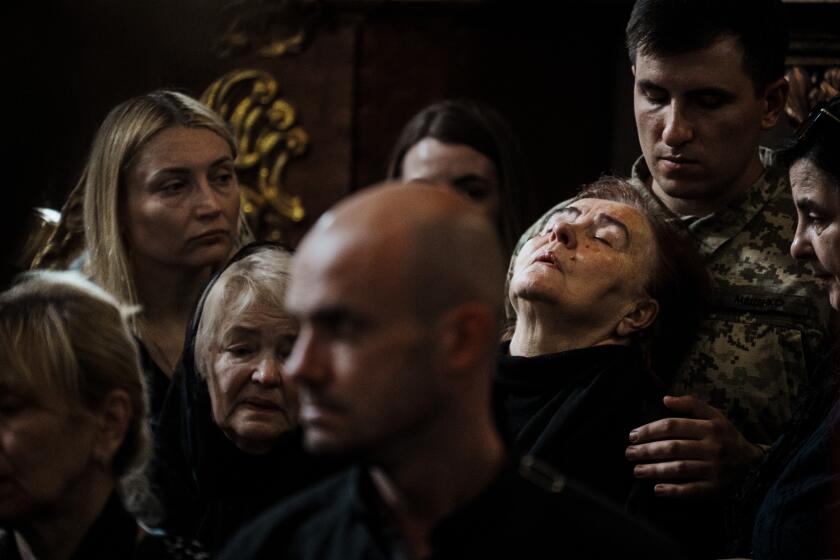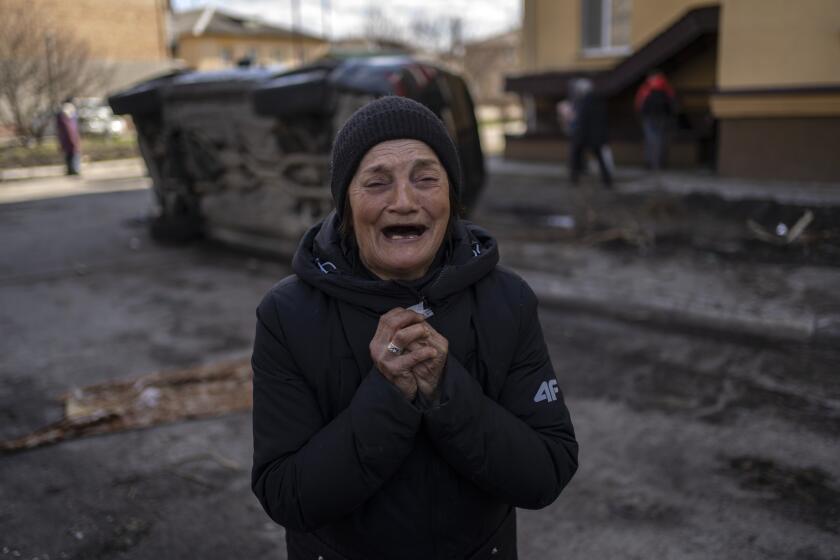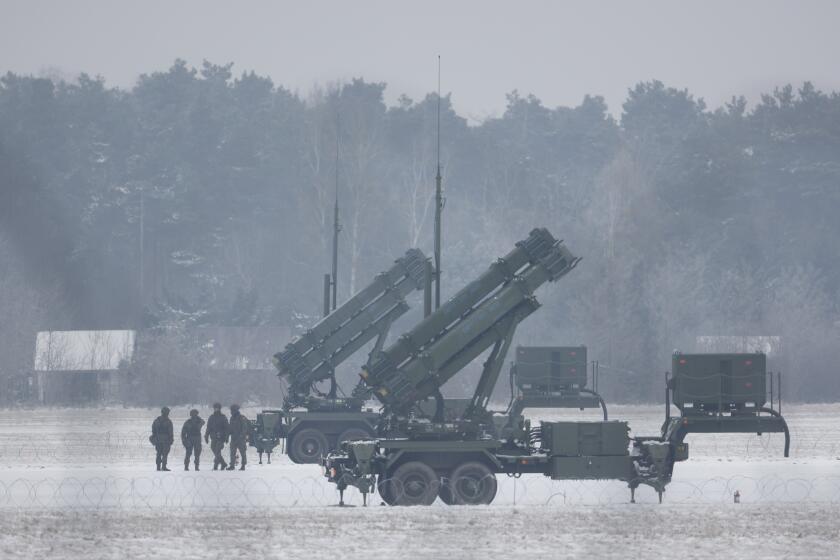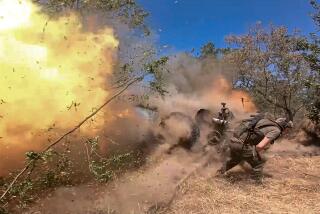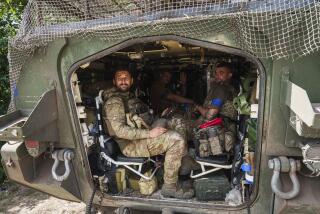Ukrainian authorities arrest man accused of helping Russia strike popular pizzeria, killing 11
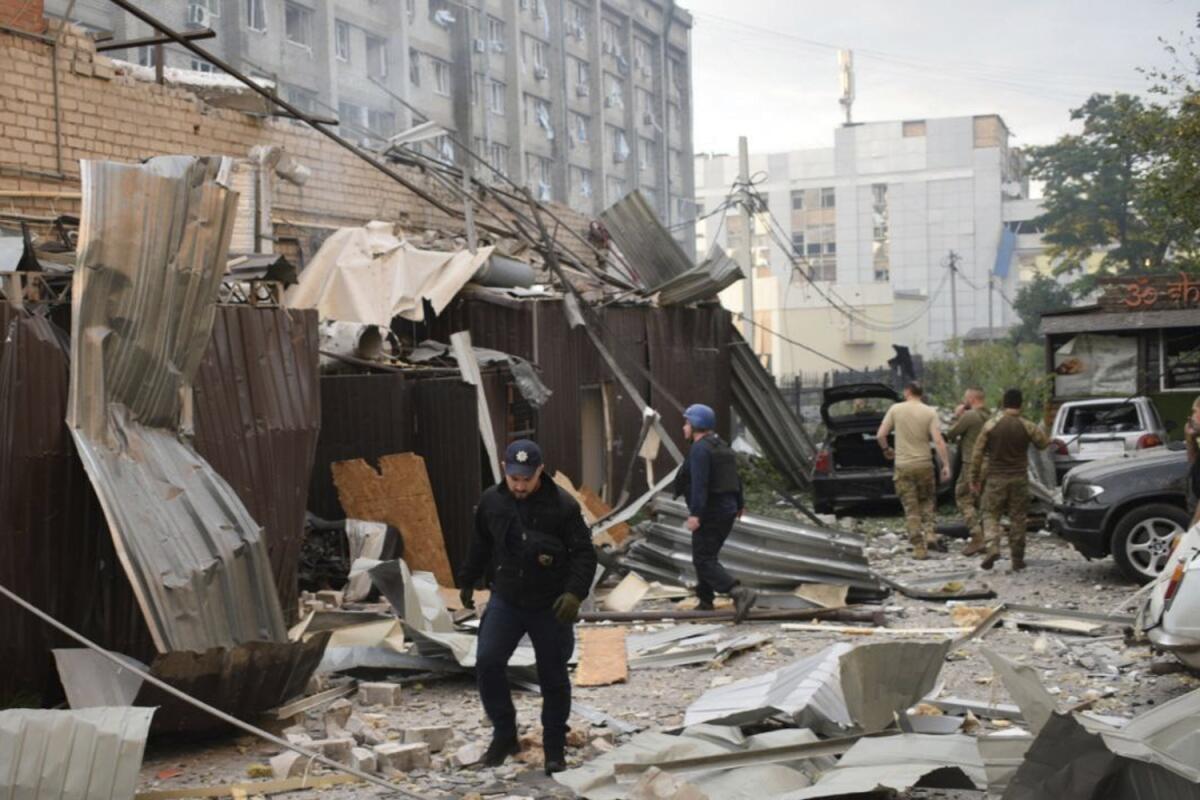
KYIV, Ukraine — Ukrainian authorities on Wednesday arrested a man they accused of helping Russia direct a missile strike that killed at least 11 people, including three teenagers, at a popular pizza restaurant in eastern Ukraine.
The Tuesday evening attack on Kramatorsk wounded 61 other people, Ukraine’s National Police said. It was the latest bombardment of a Ukrainian city, a tactic Russia has used heavily in the 16-month-old war.
The strike, and others across Ukraine late Tuesday and early Wednesday, indicated that the Kremlin is not easing its aerial onslaught, despite political and military turmoil at home after a short-lived armed uprising in Russia last weekend.
Even far from Ukraine’s front lines, military funerals set off waves of mourning. ‘You can’t see an end to it,’ one chaplain says as the war drags on.
There has been no apparent military push by Ukraine to exploit that turmoil, though the government has been tight-lipped about recent battlefield developments as it seeks to gain momentum in its recently launched counteroffensive.
The Kremlin reeled from the weekend mutiny led by Yevgeny Prigozhin, owner of the Wagner private army of prison recruits and other mercenaries. Wagner has played a key combat role for Russia in Ukraine. The rebellion posed the most serious threat so far to Russian President Vladimir Putin’s grip on power.
Trying to repair the damage to his authority, Putin met with military staff in the Kremlin on Tuesday and flew to the Caspian city of Derbent, in the mostly Muslim region of Dagestan, on the Islamic holiday of Eid al-Adha on Wednesday. He visited an ancient citadel and a historic mosque, met with officials, and walked to cheering crowds next to a fountain, talking to people and shaking hands — rare behavior for the secretive and reserved Russian leader.
Prigozhin went into exile in neighboring Belarus on Tuesday, according to Belarus President Alexander Lukashenko, after Russia said he wouldn’t face charges for the revolt. Prigozhin’s whereabouts could not be independently confirmed.
The United Nations human rights office says Russian forces carried out widespread and systematic torture of civilians who were detained in Ukraine.
Lukashenko has said his country would allow Wagner to set up a temporary camp in Belarus, but it remained unclear how many mercenaries would move there.
Wagner’s impending deployment to Belarus has rattled its neighbors. Jaroslaw Kaczynski, the leader of Poland’s ruling party, announced plans to strengthen the country’s eastern border, saying about 8,000 Wagner troops are expected to arrive in Belarus.
And Lithuanian Foreign Minister Gabrielius Landsbergis noted Tuesday that the mutiny “shows how fast detachments from within Russia mobilize and move within its territory,” underlining “a more volatile, more unpredictable environment for our region.”
Ukrainian President Volodymyr Zelensky played down concerns that Wagner would pose a threat from Belarus. He said the group’s mercenaries probably wouldn’t go there in significant numbers, and added that Ukraine’s military believes security along the Belarusian border will remain “unchanged and controllable.”
U.S. President Biden said Wednesday that the unrest had weakened Putin, though he added that it’s “hard to tell” to what extent.
“He’s clearly losing the war in [Ukraine],” Biden said of Putin before departing Washington for Chicago. “He’s losing the war at home and he has become a bit of a pariah around the world.”
NATO chief says Russia’s military shouldn’t be underestimated and the alliance has increased its readiness to confront Russia in recent days
German Chancellor Olaf Scholz also said Putin has been weakened by the rebellion, which showed “the autocratic structures, the structures of power have cracks.” Speaking to German public broadcaster ARD, he acknowledged that Germany’s foreign intelligence agency had been surprised by the rebellion.
In Kramatorsk, two sisters, both age 14, died in the attack, the City Council’s educational department said. “Russian missiles stopped the beating of the hearts of two angels,” it said in a Telegram post.
The other dead teenager was 17, according to Prosecutor General Andrii Kostin.
The attack also damaged 18 multistory buildings, 65 houses, five schools, two kindergartens, a shopping center, an administrative building and a recreational building, regional Gov. Pavlo Kyrylenko said.
Rescuers were still searching the rubble for bodies and more survivors in a city where last year, about six weeks after the start of war, 52 civilians were killed in a Russian missile strike on a train station.
Start your day right
Sign up for Essential California for the L.A. Times biggest news, features and recommendations in your inbox six days a week.
You may occasionally receive promotional content from the Los Angeles Times.
Officials initially blamed Tuesday’s strike in Kramatorsk on an S-300 missile, a surface-to-air weapon that Russia’s forces have repurposed for loosely targeted strikes on cities, but the National Police later said Iskander short-range ballistic missiles were used.
Kramatorsk is a front-line city that houses the Ukrainian army’s regional headquarters. The pizza restaurant was frequented by journalists, aid workers and soldiers, as well as residents.
The Security Service of Ukraine said the man it detained, an employee of a gas transportation company, is suspected of filming the restaurant for the Russians and informing them about its popularity.
It provided no evidence for its claim. Russia has insisted during the war that it doesn’t aim at civilian targets, although its airstrikes have killed many civilians. Kremlin spokesperson Dmitry Peskov repeated that claim on Wednesday.
The Russian Defense Ministry said its forces hit a facility used by Ukrainian army officers in Kramatorsk but did not mention the pizza restaurant that was struck.
The Pentagon says it overestimated the value of weapons sent to Ukraine by $6.2 billion over the last two years, money that can be used for more aid.
Kramatorsk is in Donetsk, one of four Ukrainian provinces that Russia annexed in September but does not fully control. In 2014, Russia also annexed Ukraine’s Crimean peninsula.
The Kremlin demands that Kyiv recognize the annexations, while Kyiv has ruled out any talks until Russian troops pull back from all occupied territories.
U.S. Secretary of State Antony J. Blinken said Wednesday that the biggest impediment now to negotiating peace is “Putin’s conviction that he can outlast Ukraine and he can outlast all of us.”
“The more we are able to disabuse him of that notion, the more likely it is that at some point he’ll come to the table,” Blinken said at the Council on Foreign Relations. He added that the North Atlantic Treaty Organization summit in Lithuania in two weeks will offer “a very robust package for Ukraine, political and practical.”
Associated Press writers Yuras Karmanau in Tallinn, Estonia; Edith M. Lederer in New York; Vanessa Gera in Warsaw and Frank Jordans in Berlin contributed to this report.
More to Read
Sign up for Essential California
The most important California stories and recommendations in your inbox every morning.
You may occasionally receive promotional content from the Los Angeles Times.
